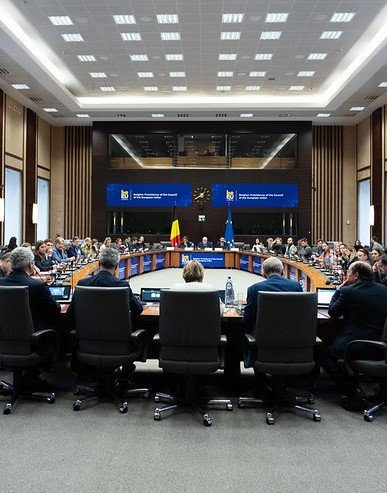Member States confirm their commitment to the fight against homelessness at the European Ministerial Meeting
Brussels, 9 February 2024 - As part of the Belgian presidency of the Council of the European Union, the Minister for Social Integration and the Fight Against Poverty hosted a two-day conference entitled 'Towards zero homelessness, only 6 years to succeed'. The event, which took place on 8 and 9 February in Brussels, brought together representatives from Member States, experts and associations dedicated to the cause, all driven by a renewed commitment to a future without homelessness.
The main aim of the conference was to assess the progress made by Member States and the European Union since the Lisbon Declaration, in which Members pledged to eradicate homelessness by 2030. Faced with this complex social challenge, participants stressed the importance of combining the efforts of all those involved in preventing and combating homelessness.
The Belgian Minister for Social Integration and the Fight against Poverty underlined the European commitment, "This issue has been an integral part of European concerns since the Lisbon Declaration in 2021 aimed at eradicating homelessness by 2030. Member States have developed proactive policies to combat this problem. Today's meeting helped to identify the best practices that will serve as a basis for reflection for the next European Commission."

European initiatives
The ministerial conference brought together a number of EU Member States and EPOCH (European Platform on Combatting Homelessness), created following the Lisbon conference in 2021. Discussions focused on the political challenges associated with homelessness, highlighting the need to coordinate the action of the different public authorities (national, regional, local), allocate the necessary budgetary resources to combating homelessness, to facilitate access to European funds, assess the number of homeless people in a standardised way, and include NGOs, homeless people and communities in the implementation of measures to combat homelessness.
Housing first
The conference also highlighted the Housing First model as a structural and sustainable response to the goal of eradicating homelessness by 2030. This model, which offers immediate access to housing with no conditions other than those (rights and duties) to which a 'regular' tenant is subject, was hailed for its positive results. In Belgium, more than 40 projects in the three regions are giving shape to this programme (and more than 1,000 Housing First support trajectories have been achieved thanks to the intensive work of the teams in the field).
This policy is actively supported by the country's three Regions and by the federal government, which has released 17.4 million euros to develop individualised support on the one hand, and to promote the acquisition of property dedicated to this model on the other.
While Housing First won consensus among the Member States around the table, some countries stressed the importance of tackling the root causes of the problem: rising rental prices, lack of social housing, mental health problems, reception of migrants, etc.
Towards a European recommendation
At the end of the conference, the Member States renewed their commitment to combating homelessness by 2030, while expressing their support for the EPOCH European Platform. Welcoming the work done so far, the participants stressed the need to strengthen the financial and political capacity of this platform. The crucial question of resources, which are essential for implementing effective measures, can be resolved at both national and European level, through European funds, the intervention of the European Central Bank and other financial support policies.
Finally, the Member States agreed to call for greater political commitment, in the form of a proposal for a European recommendation, aimed at implementing an action plan to achieve the objective of eradicating homelessness by 2030.
The conclusions of the conference will be integrated into the La Hulpe Declaration of April 2024, signed by the European Union institutions, the social partners and civil society.